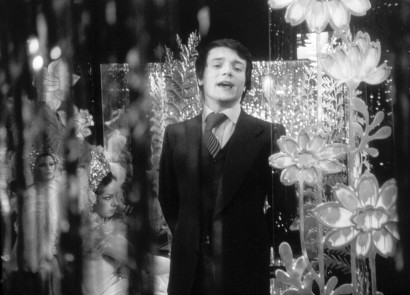MASSIMO RANIERI (Giovanni Calone) – Singer

(Naples, 1951 – )
Giovanni Calone was born in Naples on May 3, 1951, the fourth of eight children in one of the poorest neighborhoods of Naples, the Santa Lucia quarters. Because of the scarce economic possibilities of the numerous family – his father was a worker at Italsider – Massimo adapted from young age to do any type of work he could find to help the family; from delivery boy for the winery and the vegetable shop, to bartender, to worker in a laboratory that made handbags; on Sundays, he sung for weddings. It was on one of these occasions that he was noticed by musician Giovanni Atterrano who encouraged him to leave for America as a vocalist for Sergio Bruni. So in 1965 a very young Giovanni, who was given the stage name of Gianni Rock, sung on the stage of the Brooklyn Academy. It was a great success but when he came back to Naples the fairy tale ended and once more he had to roll up his sleeves and go back to work in the streets as a newspaper boy and went from restaurant to restaurant singing the most famous Neapolitan songs. In 1966 he was discovered by Enrico Polito and that year, with the stage name of Massimo Ranieri he participated in the television song event Scala Reale with the song Love is a many splendor thing. From that moment on he enjoyed a crescendo of successes and in 1969 he won the Cantagiro contest with the song Rose Rosse (red roses). In 1979 he debuted in cinema with Metello, directed by Mauro Bolognini and with co-stars Ottavia Piccolo and Lucia Bosè. The following year he played in the television movie La Sciantosa with Anna Magnani: an experience that marked his life as an actor. In 1972 Barilla, after the end of Mina’s contract, called Massimo Ranieri to sing in the commercials created by the Young & Rubicam agency, at first with Bolognini as a director, who created rarefaction atmospheres in a cycle of spots filmed in the studios in Rome and inspired to episodes of the singer’s life, and then later on with movie director Richard Lester who directed The Beatles and had the idea to do a live shooting of Ranieris’s concerts in the most beautiful squares of Central and Southern Italy. Ranieri continued to work in the theater in the following years with Giorgio Strelher, as well as in cinema, television and music, perfecting his artistic talent more and more.
Cecilia Farinelli